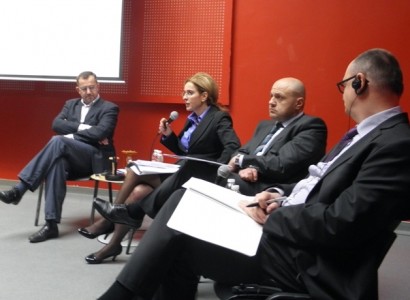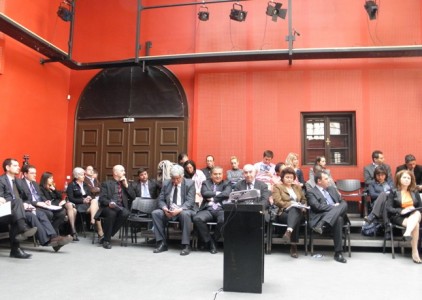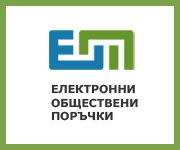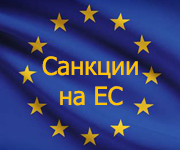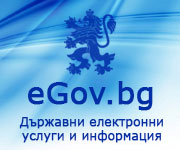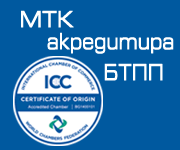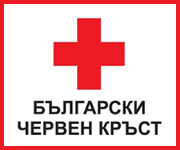Назад
Назад
“Dear policy makers, develop programmes only for your term of office”
Tsvetan Simeonov, BCCI President, during a discussion organized by the World Bank 4th April 2011, the Red House
Optimization of the state administration in all its dimensions in order to improve the quality of public services is one of the most important topics. It would be nice if each administration employee asked himself two important questions. The first question is: “Do we work for the benefit of clients and what can we do to serve them better?” The second thing that state and municipal administration employees should ask themselves at the end of each workday is “What have I done today for my clients who pay my salary?” These are the most important questions and when they are not taken into account, we come to assess the impact and discuss the problem of reducing administrative burdens.
From an economic point of view, Bulgaria faces two major problems – on the one hand, saving energy, and on the other hand, saving raw materials and materials. In fact, it would be more accurate to talk about saving materials, raw materials and energy, and utilizing wastes.
As far as EU projects are concerned, we could say that still very small and insufficient steps are being taken towards simplifying the procedures and increasing the administrative capacity. The principle that we have repeated over and over again is still not being taken into account – namely, when the documents for a project are submitted, to hold only one check-up which exhausts all notes and remarks. The administration simply shouldn’t have the right to add new requirements and to make new remarks with regard to them. Otherwise the process becomes endless and often detains and discourages the business. This often continues for months, and in some cases the employees of the respective body or institution change and the procedures have to start all over again. If we don’t resolve this matter, we won’t be able to “catch the train” – excuse me for this expression, it’s not even the train, it would be more accurate to say “the bus”, because if we catch the train there is no way to overtake the trains ahead of it, and we, as we said, want to accelerate our development. The government will be able to say that it has taken the bus only when we have absorbed at least one-fifth of the resources allocated for a specific programme. Or roughly speaking, in statistical terms this would mean to be within 20% of the sum specified for 5 years. Two years of this period passed, but we still haven’t done that. If funds absorption under some EU programme is confirmed, this would be great, but unfortunately under most programmes we don’t absorb even one-fifth of the resources.
As far as the reduction of state administration is concerned, Mr. Donchev had a point that when five state officials are reduced to three, this doesn’t necessarily mean good services. Let’s not repeat what an e-government is. The Bulgarian Chamber of Commerce and Industry has already demonstrated what electronic customer servicing is. We have implemented e-arbitration which allows lawyers, arbitrators and court officials to log in with a password and read the case materials. Thus, no one touches the cases, no one has access to the evidence and therefore cannot tear them up or mess with them, which is the case in court sometimes.
It is important to have impact assessment – take for example the dismissals of employees in the Ministry of Finance. As a result of this, we have been organizing conferences about how the North-west region could catch up with the other regions. The laying off of tax officials in Montana resulted in having to go all the way to … Veliko Tarnovo to get tax services. As we all know for every financial report or project which is being prepared, one needs to go at least three times to the tax office, which hasn’t even allocated all the payments made and therefore has to issue a reference. This has happened to us at the BCCI and to other companies as well. Having this in mind and taking into account the 250 km distance from Montana to Veliko Tarnovo, we can’t expect that someone in Montana will write and defend projects.
This is the most important message that I would like to send to our policy makers in the presence of our hosts from the World Bank. The previous government had announced 40 national programmes, and I hope that some day the programmes of this government will be counted as well. The European Union had a Lisbon Strategy, which was never implemented, however no one took responsibility for this, and now another strategy – 2020 is being developed – once again plans for the next 10 years are being made. I hope that my advice reaches the government: “Dear policy makers develop programmes using the capacity of the public administration, but only for your term of office.” Let the science institutes and universities write programmes for the next 10, 15 or 20 years, or let the political parties develop such programmes in their attempt to attract more votes. Or if such plans for the development of the country are adopted, they should be wholeheartedly approved even by the opposition and a strong consensus about them should be reached among society. For the rest, we should concentrate on the things that can be achieved within our mandate. That is why we require that the government gives reports on its work at least every 3 months. Take for example the EU – the administration apparatus is enormous. In the Foreign Affairs unit the number of diplomats grew from 3-thousand to 6-thousand after Catherine Ashton was appointed in charge of the sector. Instead, we expect clear pragmatic steps to be taken – so many bilateral agreements for access of European goods to other markets have been signed, we would like the huge problem of raised tariff barriers within the EU to be addressed as well. This is what the business expects and not efforts of the administration in general. Recently, the European Economic and Social Committee had to come out with a position on an Act concerning the harmful “exhaust gas emissions of agricultural tractors”. I’m sorry, probably this issue is important too, but we have problems related to overcoming the financial crisis to solve.
04.04.2011
Още новини:
-
31-03-2011
-
30-03-2011
-
28-03-2011
-
28-03-2011

 1 USD =
1 USD =  1 GBP =
1 GBP =  1 CHF =
1 CHF =  ISO 9001:2015
ISO 9001:2015
